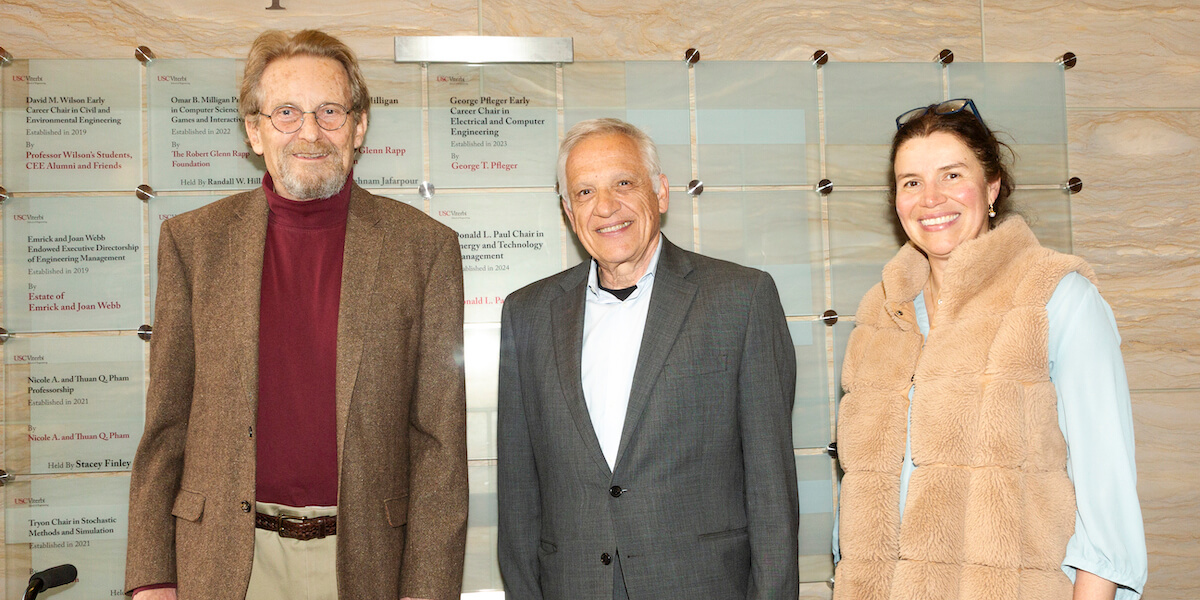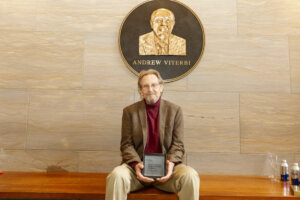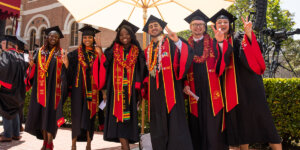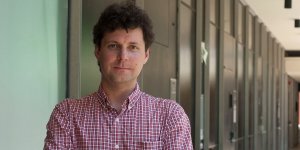
Left to Right: Donald Paul, USC Viterbi’s William M. Keck Chair of Energy Resources and executive director of the USC Energy Institute, USC Viterbi Dean Yannis Yortsos, and Andrea Hodge, USC Viterbi’s Fluor Professor in Engineering and Professor of Chemical Engineering and Materials Science and Aerospace and Mechanical Engineering
The USC Viterbi School of Engineering is expanding its capabilities in energy transition research and education through the newly established Donald L. Paul Chair in Energy and Technology Management.
Funded by a significant gift from Donald Paul, USC Viterbi’s William M. Keck Chair of Energy Resources and executive director of the USC Energy Institute, the new chair aims to expand the opportunities for energy innovation at USC Viterbi and beyond.
“The Donald L. Paul Chair in Energy and Technology Management marks a significant milestone, being the first endowed chair at USC Viterbi dedicated to sustainability and the ongoing energy transition,” USC Viterbi Dean Yannis C. Yortsos said. “As energy continues to shape our world, this chair is a beacon for candidates with both technical experience and management acumen.”
After 33 years at the Chevron Corporation, retiring as vice president and chief technology officer, Paul joined the USC Viterbi faculty in 2008, bridging the gap between industry leadership and academic research. Receiving B.S., M.S. and Ph.D. degrees from the Massachusetts Institute of Technology (MIT), he is recognized as a leader in identifying and applying advancing technologies for conventional and evolving energy sources.
“I have found that students appreciate the opportunity to learn from individuals that have genuine industry experience and knowledge,” said Paul. “Through this endowed chair position, I wanted to create an opportunity where we can identify leaders from the energy industry who could share that knowledge with students for years to come.”
In December 2003, Paul created a unique partnership between Chevron and USC Viterbi to establish the Center for Interactive Smart Oilfield Technologies (CiSoft). Two decades later, this unique collaboration on “Digital Energy” has garnered $46 million in research funding and resulted in the creation of 42 patents. The Donald L. Paul Chair in Energy and Technology Management will create a new legacy in the much needed area of energy transition, attracting new industry leaders to USC Viterbi’s Mork Family Department of Chemical Engineering and Materials Science.

Donald Paul holding a plaque to commemorate the new Donald L. Paul Chair in Energy and Technology Management
“Finding someone who brings intellect, generosity, industry knowledge and experience to USC Viterbi like Don will be a difficult task,” said John Mork, B.S. ’70 and M.S. ’12, former chair of the USC board of trustees. “However, the establishment of this endowed chair within the Mork Family Department is critically important to our commitment of equipping students with the necessary skills needed for success in the competitive energy sector marketplace.”
The new endowed chair will build upon existing renewable energy research and initiatives at USC Viterbi, including the Ershaghi Center for Energy Transition (E-CET), launched in 2022 with a gift from Gary Buntmann (B.S. ’80) and Mary Buntmann. Led by Iraj Ershaghi, professor of chemical engineering and materials science and Omar B. Milligan Chair in Petroleum Engineering, the center focuses on creating new technologies and advancing research across a wide range of energy-related areas from industrial decarbonization to CO2 conversion to the development of the next generation of engineers needed for the Energy Transition.
“This endowed chair is the latest hallmark of Don Paul’s enduring contributions to USC,” said Ershaghi. “He has helped students in so many ways, including the Donald L. Paul Scholarship, and he has been my main mentor, a supporter and a tremendous resource. I have no doubt this position will be another successful contribution to USC from Don Paul.”
When C.L. Max Nikias, USC president emeritus, provost and former USC Viterbi dean, recruited Paul to join USC 15 years ago, he says he wasn’t just making a strategic move. He was orchestrating a game-changer for the school’s future – nothing short of a catalyst for excellence.
“Don Paul has possessed an extraordinary understanding of global energy trends,” said Nikias, who recruited Paul during his tenure as provost, “and an uncanny ability to transmit that understanding to students and others. His recruiting to USC marked a significant milestone in our efforts to elevate our energy research and education programs to an entirely new level.”
Nikias added: “His vision of the rapidly changing energy landscape encompasses the hydrocarbon industry, complex regulatory environment in which it operates, technological innovations, alternative energy strategies and cutting-edge research.”
Paul’s ties to USC run deep, tracing back to his father, Glenn A. Paul, who graduated from USC engineering in 1950. Glenn A. Paul will now be honored by his son with a named faculty lounge in the new Dr. Allen and Charlotte Ginsburg Human-Centered Computation Hall, opening in the summer of 2024. As Paul’s legacy is cemented through the Donald L. Paul Chair in Energy and Technology Management, his impact will also live on at USC Viterbi – inspiring future generations of engineers to embrace their potential, forge new paths, and leave a lasting impact on the world.
“I’m honored to give back to USC,” said Paul, “because this university has given me so much, not only by enabling me to have a rewarding second career, but allowing me to continue contributing to the energy field while nurturing the next generation of engineers who will shape the future.”
Published on March 21st, 2024
Last updated on March 22nd, 2024













